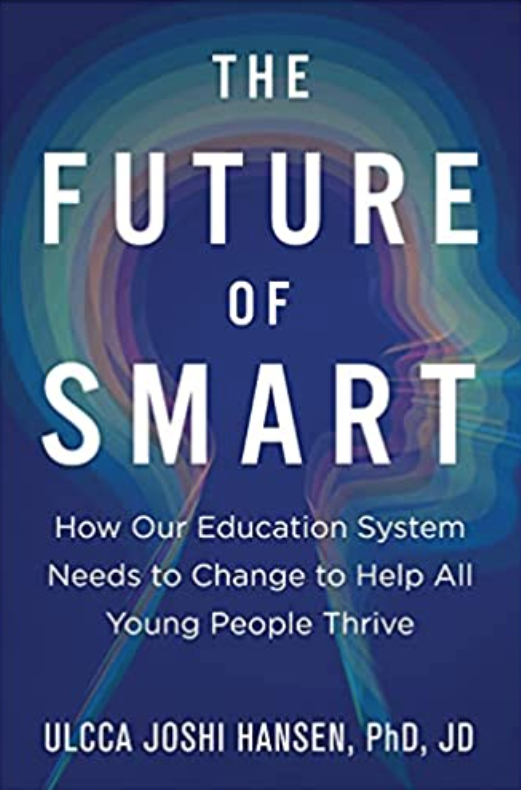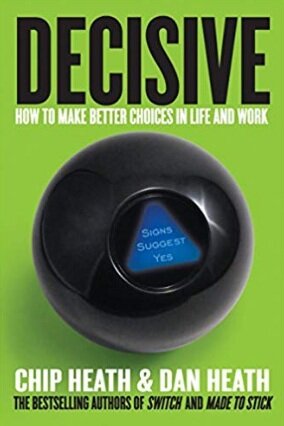Free Content. Subscription Services. Customized Workshops.
To view a distillation click on the book cover or Read More link below the excerpt. Not sure how to use the distillations to improve your practice, learn more about them on our Distillations Explained page.
To find another book, return to the Book Search page.
Algorithms to Live By
At first blush, Algorithms to Live By might seem too narrow to support our work in education. In reality though, there are concepts and dilemmas throughout that can reframe our work. If you see yourself as an analytical or model thinker, there will be sections here that will push your thinking and improve your school for sure.
Design Thinking for School Leaders
If you’ve ever thought that it would be easier to scrap the current system of education and start over… then Design Thinking for School Leaders was written for you. Gallager and Thordarson show how empathy combines with being an “opportunity seeker”, “experience architect”, “rule breaker”, “producer”, and “storyteller” to create a culture where designing change becomes the norm.
Leading with Gratitude
We know there is a huge gap between how often school leaders feel they appreciate those they lead and how appreciated the average teacher feels. Leading with Gratitude is the antidote! It’s hard to imagine a better book for a school leader to read than this one. It might affirm you are showing gratitude enough and in the right ways or it could transform how you interact with others.
When
Daniel Pink’s When showcases extensive research and enlightening case studies to explain how and why timing is so important to human flourishing and productivity. Simple tweaks of school schedules would boost test scores, lower depression, increase student cognition, and even improve decision-making among faculty and administration. For this reason and many others, all educators would all benefit from a deeper exploration of this enjoyable read.
Extreme Ownership
If you have respect for both those who serve in the military and sound business practices, then Extreme Ownership is the book for you. Want war stories? Check. Want to live in the intersection between military tactics/strategies and leading a school? Check. Looking to step up your leadership game by taking responsibility for everything that happens in your school? Triple check!
Conscious Leadership
If Simon Sinek, Carol Dweck, and Brene Brown participated in a weekend book writing blitz, they may well have produced this book. A variety of themes filtered through the lens of business (particularly Whole Foods) gives us an intentional path to Conscious Leadership.
The Infinite Game
In this book, Simon Sinek draws a line between organizations with short-term thinking/goals and those playing The Infinite Game. He argues that those leading with future generations in mind will create cultures that will weather hard times, inspire others, and build organizations that will thrive.
Mindful School Communities
Mindful School Communities by Mason, Rivers Murphy, and Jackson have written a practical guide for school leaders and teachers who wish to create a school environment in which students can develop skills to cope with stress and pressure. By creating schools where teachers and administrators model positive relationships with each other and with the students in their care, students can learn how to care for their own social and emotional well-being which can better help students develop academic skills.
The Future of Smart
Have you ever wondered why we offer a similar education to nearly every child around the world? Have you thought about why we use grades and standardized tests to measure learning when real-world learning looks nothing like that? Hansen uses The Future of Smart to explain the educational landscape in terms of where we’ve come from, where we are, and where we should go.
Stretch
Stretch by Scott Sonenshein will encourage you to do more with less...and then show you how to do it. Concepts such as chasing, stretching, and being cognitively entrenched, combined with cautionary tales (Gerber singles, anyone?) and success stories (Yuengling and the book Green Eggs and Ham) to frame why it’s important to think more about “stretching” than “chasing.”
Range
David Epstein uses Range to convince the reader that it may in fact be the generalists who add more value as the world becomes more and more complex. His basic premise is that for complex problem-solving and decision-making, it is often those with broad experience and diverse backgrounds who fare better (e.g., professionals with hobbies outside of their profession).
Braving the Wilderness
Do you desire true belonging? Are you courageous to the point that you always stay true to who you are? In Braving the Wilderness, Brene Brown breaks up the word B-R-A-V-I-N-G into a wilderness checklist because you are going to have to be brave enough to enter the unknown wilderness of vulnerability to achieve that sense of belonging.
Post Corona
In Post Corona, Scott Galloway brings us into the future world economy and the forces that will drive it. While less about Corona than the title implies, it’s a clear window into the future from a great thinker. We would serve students better if we began to think a bit more like Scott Galloway about what’s to come... in education.
Decisive
Decisive by Chip and Dan Heath is packed with theories, research examples, models, and protocols around decision-making. It doesn’t matter whether you are well-read on the topic or new to the models/ideas, there is plenty here to keep you reflecting on your decisions from the past and mapping out your upcoming choices.
Getting to Yes
Have you ever been involved in a negotiation or disagreement and been frustrated by the resolution process or outcome? If so, Fisher, Ury, and Patton have the solution for next time in Getting to Yes. The reader will learn why stating interests rather than positions is key, why where you sit matters, and why acknowledging the worth of the other party are all keys to success.
The Practice of Adaptive Leadership
Ask yourself these questions: Is your leadership team adaptive? Are you thinking that being more nimble might make you a better team? If you answered yes to either of these questions, then pick up The Practice of Adaptive Leadership and explore.
Upstream
In Upstream, Dan Heath teaches us to think about problem-solving from the root causes, as opposed to the normal focusing on the results. This is a great read for anyone interested in thinking about improving the world through ideas such as deploying ambulances more efficiently, providing housing to more people, and ensuring that more students graduate high school.
The Four
The solid takeaways here (e.g., about 1 in 6 internet searches are new, more American families have Amazon Prime than own a gun, etc.) help us wonder how consumerism and technology will impact the world of learning. If you want to read about educational prototypes- go elsewhere. If you want to learn about the modern economy and then try to make connections to the future of education, there may not be a better book.
The Model Thinker
In The Model Thinker, Scott E. Page takes the reader through the whys and hows of model thinking followed by dozens of models to help us understand the world. However, in the final analysis, this book is lacking in models that are directly impactful for educators, but knowing there are models out there that drive policy will cause all of us to make decisions using logic and data via the models we find adjacently relatable.
The Talent Code
In The Talent Code, Daniel Coyle proposes all hotbeds of talent (e.g., Russian female tennis players from 2005-2007, Dominican players in the Major Leagues, the home that produced the three Brontë sister authors) have commonalities: Deep practice, Ignition, and Master Coaching. In some ways the sociological equivalent to Daniel Pink's Drive, The Talent Code offers solid examples of how myelin is the key to developing talent.




















